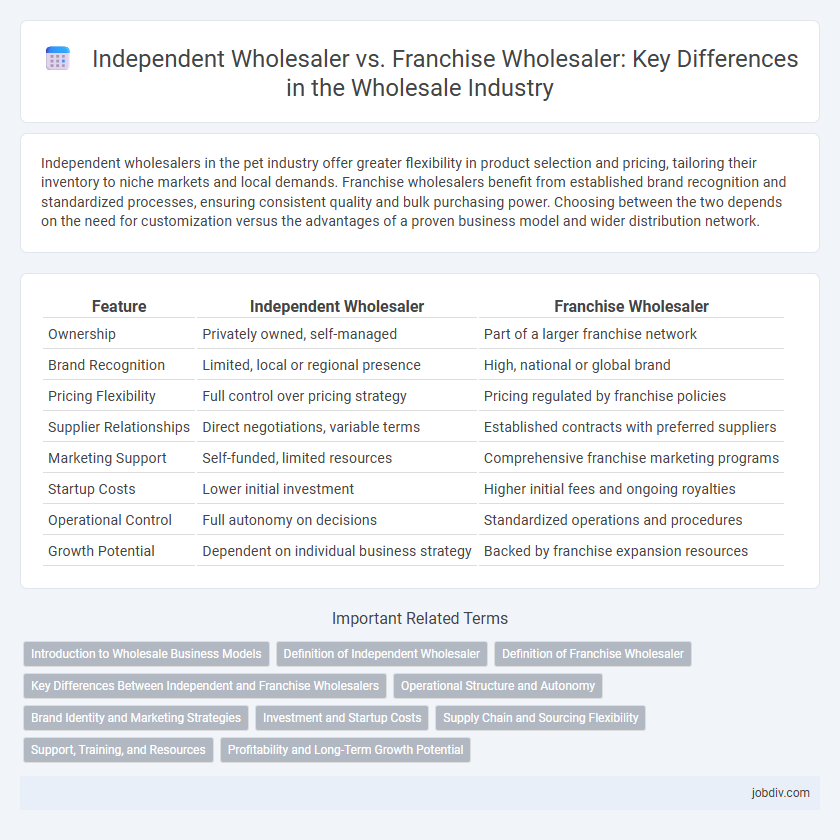Independent wholesalers in the pet industry offer greater flexibility in product selection and pricing, tailoring their inventory to niche markets and local demands. Franchise wholesalers benefit from established brand recognition and standardized processes, ensuring consistent quality and bulk purchasing power. Choosing between the two depends on the need for customization versus the advantages of a proven business model and wider distribution network.
Table of Comparison
| Feature | Independent Wholesaler | Franchise Wholesaler |
|---|---|---|
| Ownership | Privately owned, self-managed | Part of a larger franchise network |
| Brand Recognition | Limited, local or regional presence | High, national or global brand |
| Pricing Flexibility | Full control over pricing strategy | Pricing regulated by franchise policies |
| Supplier Relationships | Direct negotiations, variable terms | Established contracts with preferred suppliers |
| Marketing Support | Self-funded, limited resources | Comprehensive franchise marketing programs |
| Startup Costs | Lower initial investment | Higher initial fees and ongoing royalties |
| Operational Control | Full autonomy on decisions | Standardized operations and procedures |
| Growth Potential | Dependent on individual business strategy | Backed by franchise expansion resources |
Introduction to Wholesale Business Models
Independent wholesalers operate autonomously, sourcing products directly from manufacturers to sell to retailers or businesses, allowing greater flexibility and personalized business strategies. Franchise wholesalers function under established brand names and standardized systems, benefiting from franchise support, marketing, and operational guidelines. Choosing between independent and franchise wholesale models depends on factors such as control preferences, risk tolerance, and access to established markets.
Definition of Independent Wholesaler
An independent wholesaler operates as a standalone entity, purchasing goods from manufacturers and selling them to retailers or other businesses without affiliation to a larger franchise network. Unlike franchise wholesalers, independent wholesalers have full control over their business decisions, inventory selection, and pricing strategies. This autonomy enables them to tailor their services to niche markets and adapt quickly to changing demand.
Definition of Franchise Wholesaler
A franchise wholesaler operates under a licensed brand name, following strict guidelines set by the franchisor while maintaining individual ownership of the business. This model allows wholesalers to benefit from established brand recognition, marketing support, and operational procedures, enhancing their market presence and customer trust. Unlike independent wholesalers, franchise wholesalers must adhere to franchise agreements that dictate pricing, product selection, and promotional activities.
Key Differences Between Independent and Franchise Wholesalers
Independent wholesalers maintain full control over their business operations and often have flexible pricing strategies, enabling them to tailor services to local market demands. Franchise wholesalers, on the other hand, operate under a standardized brand with strict guidelines, benefiting from established supply chains and marketing support but limited autonomy. The key differences center on operational control, brand consistency, and the level of support provided by the franchisor.
Operational Structure and Autonomy
Independent wholesalers operate with full autonomy, managing their procurement, pricing, and distribution strategies without external control, enabling flexible decision-making tailored to local market demands. Franchise wholesalers function within a structured operational framework dictated by the franchisor, adhering to standardized processes, branding, and pricing policies that ensure consistency across locations. This centralized control in franchises contrasts sharply with the decentralized, autonomous nature of independent wholesalers, affecting scalability, brand identity, and adaptability.
Brand Identity and Marketing Strategies
Independent wholesalers maintain unique brand identities, allowing for tailored marketing strategies that cater to specific local markets, enhancing customer loyalty and differentiation. Franchise wholesalers leverage established brand recognition and standardized marketing approaches, benefiting from larger-scale promotional campaigns and consistent customer expectations. Brand control in independent wholesaling fosters innovation, while franchises gain efficiency and trust through uniform branding and corporate-backed advertising.
Investment and Startup Costs
Independent wholesalers typically require lower startup costs and offer greater flexibility in investment, enabling entrepreneurs to tailor their business approach without franchise fees or royalty payments. Franchise wholesalers demand higher initial investments due to franchise fees, mandatory equipment purchases, and advertising contributions, but provide established branding and proven business models. Evaluating capital availability and risk tolerance is crucial when choosing between the autonomy of an independent wholesaler and the structured support of a franchise wholesaler.
Supply Chain and Sourcing Flexibility
Independent wholesalers offer greater sourcing flexibility by directly negotiating with multiple suppliers, enabling tailored inventory selection and responsiveness to market changes. In contrast, franchise wholesalers operate within predefined supply chains dictated by franchisors, limiting their ability to diversify suppliers but benefiting from consistent quality and bulk purchasing advantages. This structural difference significantly impacts supply chain agility, with independent wholesalers adapting swiftly to demand fluctuations while franchise wholesalers leverage standardized supply processes for operational efficiency.
Support, Training, and Resources
Independent wholesalers often benefit from greater autonomy but face limited access to centralized support, specialized training programs, and comprehensive resources compared to franchise wholesalers. Franchise wholesalers typically receive extensive corporate backing, including standardized training modules, marketing resources, and ongoing operational support that enhance consistency and efficiency. Access to these structured programs allows franchise wholesalers to more swiftly adapt to market changes and leverage brand recognition for growth.
Profitability and Long-Term Growth Potential
Independent wholesalers often experience higher profit margins due to lower operational fees and greater flexibility in pricing and supplier negotiations. Franchise wholesalers benefit from established brand recognition and centralized marketing, contributing to steady revenue streams and easier market entry, but they must share profits through franchise fees, which can limit net gains. Over the long term, independent wholesalers possess greater growth potential by adapting quickly to market changes, while franchise wholesalers leverage their network's stability for consistent expansion.
Independent Wholesaler vs Franchise Wholesaler Infographic

 jobdiv.com
jobdiv.com